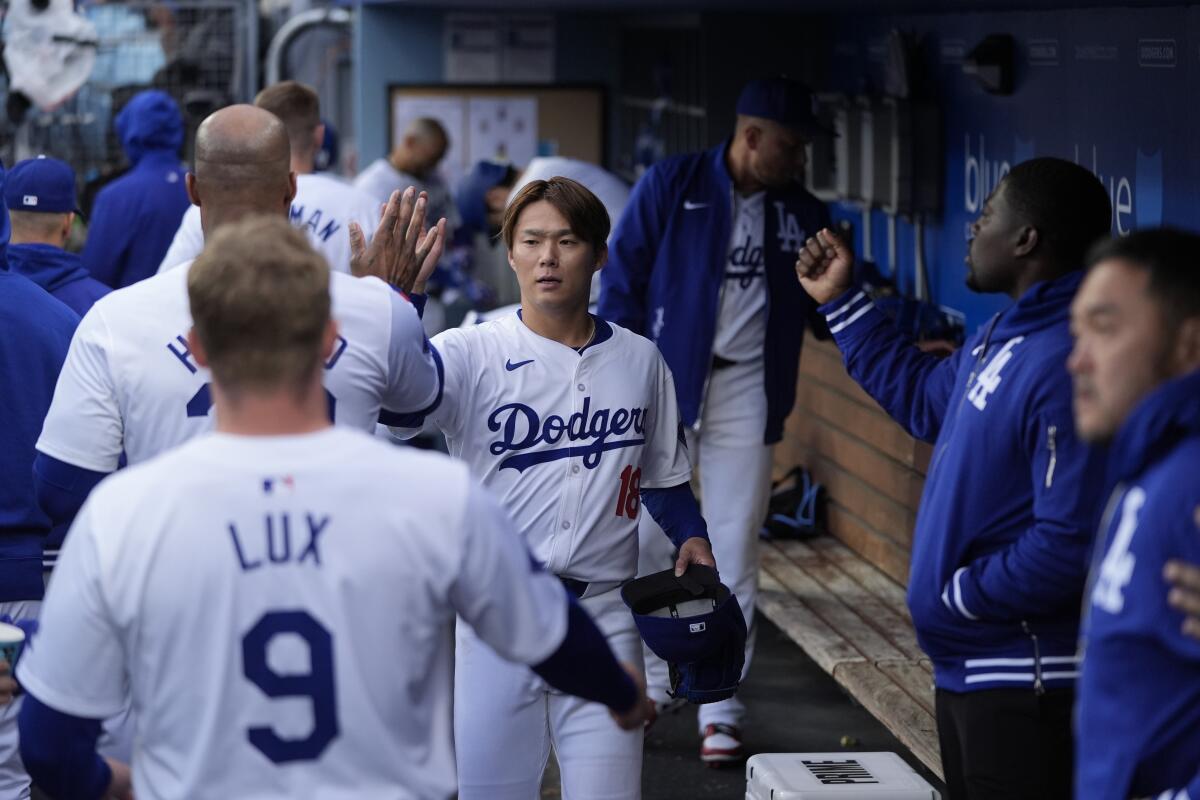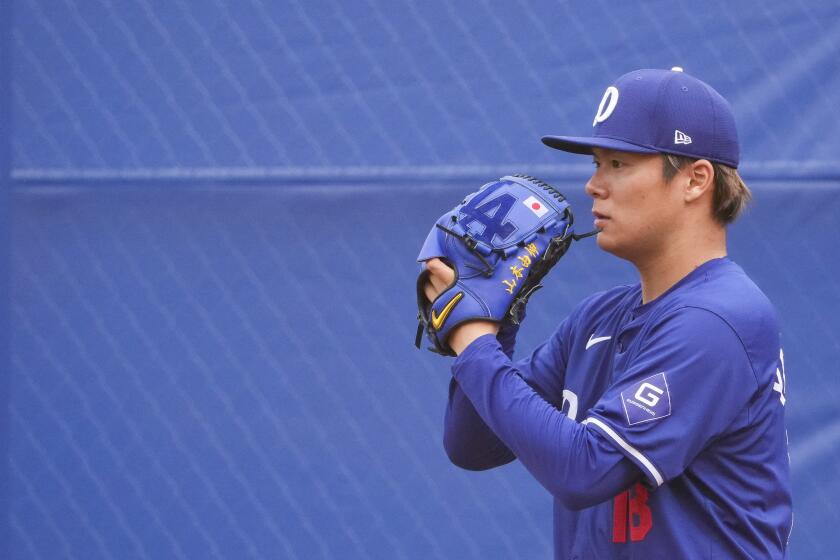Column: Forget the loss. Dodgers starter Yoshinobu Yamamoto proves he can pitch in MLB

- Share via
Sighs of relief were heaved everywhere.
On the bench, by the coaches and players on his team. In the executive offices, by the decision makers who signed him. Most critically, on the mound, by the pitcher himself.
Yoshinobu Yamamoto can pitch in the major leagues.
Eight days after a cataclysmic debut in South Korea that raised concerns about whether the Dodgers set $375 million ablaze when they signed Yamamoto, the Japanese right-hander pitched five scoreless innings in a 10-inning, 6-5 defeat to the St. Louis Cardinals.
The roots of Yoshinobu Yamamoto’s success? The choice to defy convention and be willing to adapt even at an early stage of his career with the Orix Buffaloes.
Reliever Joe Kelly’s seventh-inning meltdown cost Yamamoto a win and the Dodgers the game, but who was complaining?
“You lose a ballgame, never feels good,” manager Dave Roberts said. “But the main takeaway for us is that Yoshinobu had a tremendous night and that was the most positive thing for all of us.”
Questions remain about whether Yamamoto can be the No. 1 or 2 pitcher the Dodgers envisioned or how his slight 5-foot-10 frame will hold up over a 162-game season.
By striking out the side in the first inning and limiting the Cardinals to two hits, however, Yamamoto relieved the Dodgers of the fears that emerged in the wake of a dismal performance against the San Diego Padres.
The Dodgers don’t have to worry anymore about whether Yamamoto can pitch at this level. They also don’t have to worry about how he’ll respond when cornered.

“As you’re around players more, you start to learn more about them,” Roberts said. “I think with Yoshinobu, there’s a lot of confidence and there’s a lot of pride and fire. Appreciating the contract and his part of the deal, I think he took it personal.”
In the season-opening series in South Korea against the Padres, Yamamoto lasted just one inning and was charged with five runs.
“I wasn’t too panicked or unsure of myself,” Yamamoto said in Japanese, “but I failed in my previous start, so between that game and today felt like an extremely long time.”
In his previous start, Yamamoto had to deal with pitching after traveling to the other side of the world. In this game, he had to pitch in the light drizzle and return from a 35-minute rain delay between the fourth and fifth innings.
“I think it must have been difficult for him to pitch in the rain,” designated hitter Shohei Ohtani said in Japanese. “But he remained composed after he came back [after the delay] and I thought he pitched incredibly well.”
Shohei Ohtani pops out with the bases loaded in the 10th inning as the Dodgers lose to the St. Louis Cardinals after a strong start by Yoshinobu Yamamoto.
If not for the rain delay, Roberts said, Yamamoto could have pitched six or seven innings.
Yamamoto controlled his fastball better than he did the last time and touched 96 mph again. His splitter and curveball were effective.
He made changes to his delivery when pitching out of the stretch. He positioned his glove farther from his body when he came set, which he started working on in spring training to improve deception.
In the days after his start in South Korea, Yamamoto said, “I had a very specific plan about how to proceed.”
This clarity of vision was one of his greatest attributes when he pitched for the Orix Buffaloes of the Japanese league. In the seven years Yamamoto pitched for the Buffaloes, he entirely overhauled his delivery twice. Compared to that, the small modifications he made over the last week were nothing.
Listening to him, it sounded as if he thought the changes to his mental approach were equally, if not more, vital to his success.
“I was able to calm down more and pitch my game,” Yamamoto said. “This is a different place, but I tried to do what I did when I pitched in Japan. I tried to recreate the feelings I had when I pitched really well and went in relaxed.”
A generation that was supposed to have dismissed baseball has found its way back to it. Baseball isn’t dying, but it could have been. Its revival required a game plan.
Yamamoto gave up a single to Matt Carpenter in the second inning and a two-out double to Alec Burleson in the fifth. That was it. He struck out five batters and walked none.
He was grateful to the home crowd, which gave him a standing ovation as he scaled the mound.
“The cheers were incredible and I was able to pitch feeling really good,” he said.
Yamamoto also received a pick-me-up from someone in the organization. Before the game, he discovered a sandwich bag taped to the frame of his locker with a teru teru bozu inside. The doll is hung from windows by Japanese children who wish for sunny weather.
“It wasn’t me,” Ohtani said with a smile.
The source of the doll, which was constructed of tissue paper, was also a mystery to Yamamoto.
“I don’t know,” he said. “Who was it? I haven’t found out.”
The rain still came, but the doll still brought him good fortune. After a week that felt like an eternity, Yamamoto rediscovered himself.
More to Read
Are you a true-blue fan?
Get our Dodgers Dugout newsletter for insights, news and much more.
You may occasionally receive promotional content from the Los Angeles Times.










